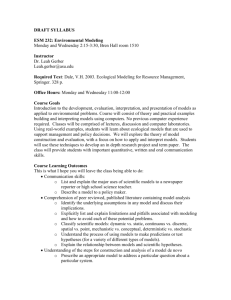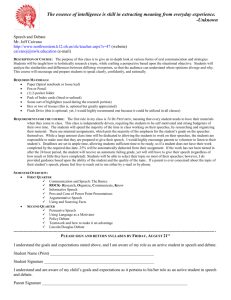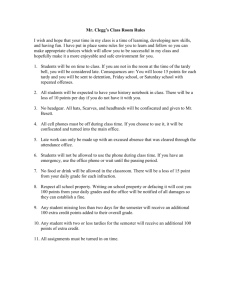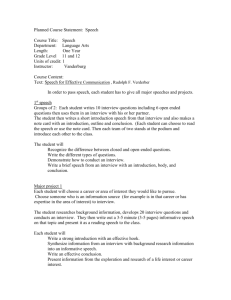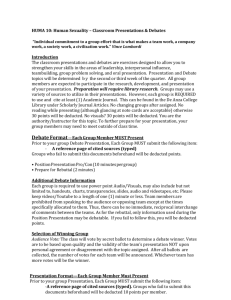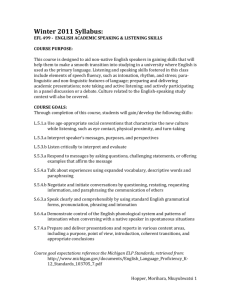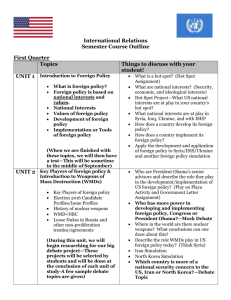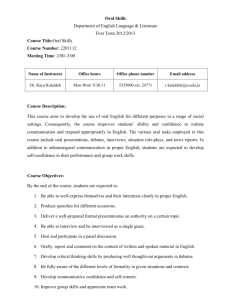The Six Pillars of Education at Lindbergh High School
advertisement
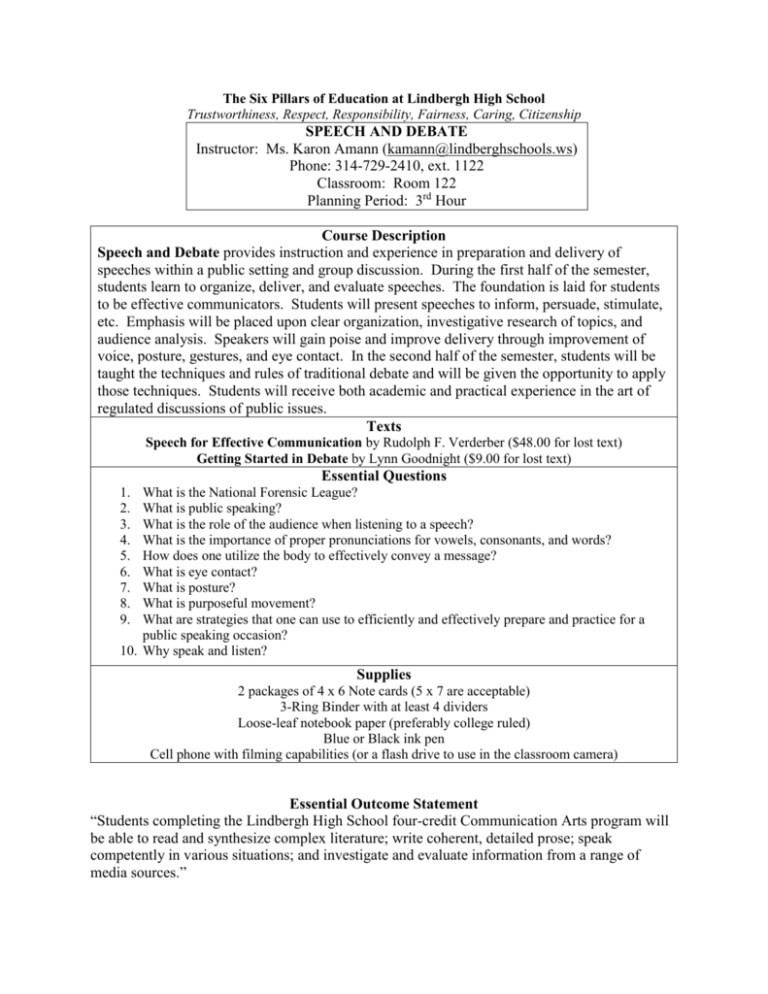
The Six Pillars of Education at Lindbergh High School Trustworthiness, Respect, Responsibility, Fairness, Caring, Citizenship SPEECH AND DEBATE Instructor: Ms. Karon Amann (kamann@lindberghschools.ws) Phone: 314-729-2410, ext. 1122 Classroom: Room 122 Planning Period: 3rd Hour Course Description Speech and Debate provides instruction and experience in preparation and delivery of speeches within a public setting and group discussion. During the first half of the semester, students learn to organize, deliver, and evaluate speeches. The foundation is laid for students to be effective communicators. Students will present speeches to inform, persuade, stimulate, etc. Emphasis will be placed upon clear organization, investigative research of topics, and audience analysis. Speakers will gain poise and improve delivery through improvement of voice, posture, gestures, and eye contact. In the second half of the semester, students will be taught the techniques and rules of traditional debate and will be given the opportunity to apply those techniques. Students will receive both academic and practical experience in the art of regulated discussions of public issues. Texts Speech for Effective Communication by Rudolph F. Verderber ($48.00 for lost text) Getting Started in Debate by Lynn Goodnight ($9.00 for lost text) Essential Questions 1. 2. 3. 4. 5. 6. 7. 8. 9. What is the National Forensic League? What is public speaking? What is the role of the audience when listening to a speech? What is the importance of proper pronunciations for vowels, consonants, and words? How does one utilize the body to effectively convey a message? What is eye contact? What is posture? What is purposeful movement? What are strategies that one can use to efficiently and effectively prepare and practice for a public speaking occasion? 10. Why speak and listen? Supplies 2 packages of 4 x 6 Note cards (5 x 7 are acceptable) 3-Ring Binder with at least 4 dividers Loose-leaf notebook paper (preferably college ruled) Blue or Black ink pen Cell phone with filming capabilities (or a flash drive to use in the classroom camera) Essential Outcome Statement “Students completing the Lindbergh High School four-credit Communication Arts program will be able to read and synthesize complex literature; write coherent, detailed prose; speak competently in various situations; and investigate and evaluate information from a range of media sources.” COURSE OVERVIEW Quarter One (Speech) Introduction Speech Body Language Voice Quality Determining Subject/Purpose Analyzing Audience Supporting Main Points Selecting, Phrasing and Arranging Ideas Beginning and Ending the Speech PROCESS SPEECH EXPOSITORY SPEECH PERSUASIVE SPEECH Quarter Two (Debate) Investigation Critical Thinking Speaking Skills Review Critical Listening Skills Teamwork and Cooperation Speaker Strategies and Responsibilities Analyzing Propositions Evaluating Evidence Refutation LINCOLN-DOUGLAS DEBATE STANDARD DEBATE Electronic Devices Students will be allowed to film their oral presentations on their cell phones throughout the semester in order to preview their speaking skills outside the classroom; therefore, cell phone use will be limited to filming but not to texting and personal phone calls (or SELFIES!). Anyone violating the classroom guidelines for cell phone use will have his/her phone confiscated. Grading Students will be graded on all oral presentations, chapter/film quizzes, evaluation sheets for peer presentations, class participation, worksheets, and IMPROVEMENT. Final grades will consist of all accumulated points for both quarters. The semester grade will consist of 45% for each quarter and 10% for the final oral presentation/exam. 90-100%=A 80-89%=B 70-79%=C 60-69%=D Below 60%=F Attendance When a student is absent on the day of a scheduled oral presentation, he/she has five school days o reschedule the presentation. Since students receive grades for evaluating their peers’ presentations, any points missed during an absence will be made up with impromptu speeches (at the teacher’s discretion). Tardies The LHS tardy policy will be observed (refer to Student Handbook). If a student is late to class and another student is giving an oral presentation, the tardy student is to remain outside the classroom until the completion of the presentation so as not to distract the speaker. Courtesy is always appreciated in a public speaking situation. Expectations for Oral Presentations Students will be expected to turn in a formal SENTENCE OUTLINE and WORKS CITED page before each speech. Students will be expected to wear PROFESSIONAL DRESS when giving a speech (gentlemen: tie, collared shirt, nice slacks, no tennis shoes; ladies: skirt or dress or nice slacks, no tennis shoes). * Note: There will be a small collection of dress clothes available in the classroom for “borrowing” if you do not own dress clothes! REMEMBER, EACH ORAL PRESENTATION IS FILMED. TRY TO LOOK YOUR BEST FOR POSTERITY! Classroom Behavior All school rules and policies specified in the LHS Student Handbook will be enforced throughout the semester. Since it is imperative that students be attentive during all oral presentations, anyone causing a distraction during another student’s presentation will be asked to leave the room until the completion of the presentation. A parent contact will be made if a second offence of this nature occurs.
